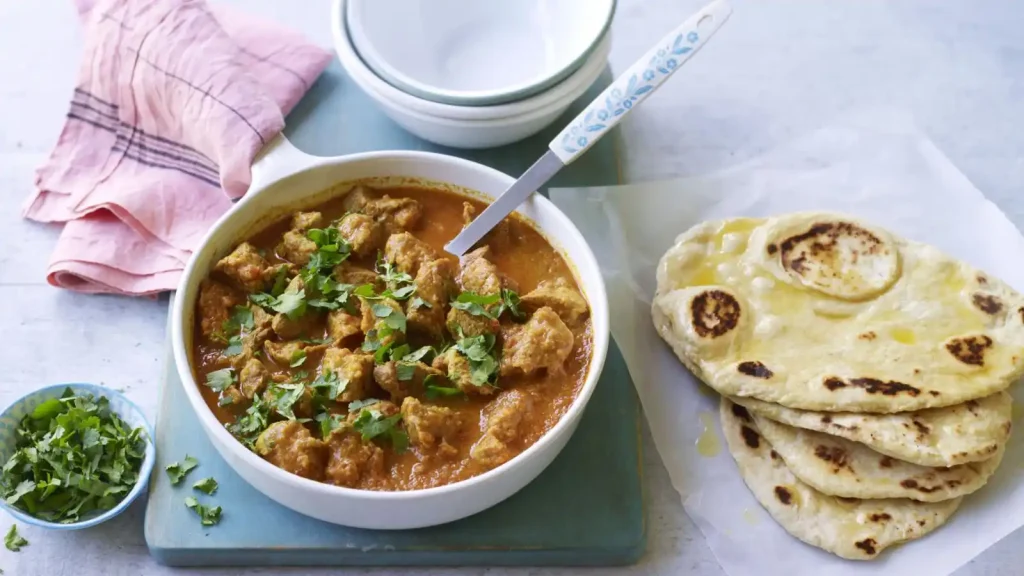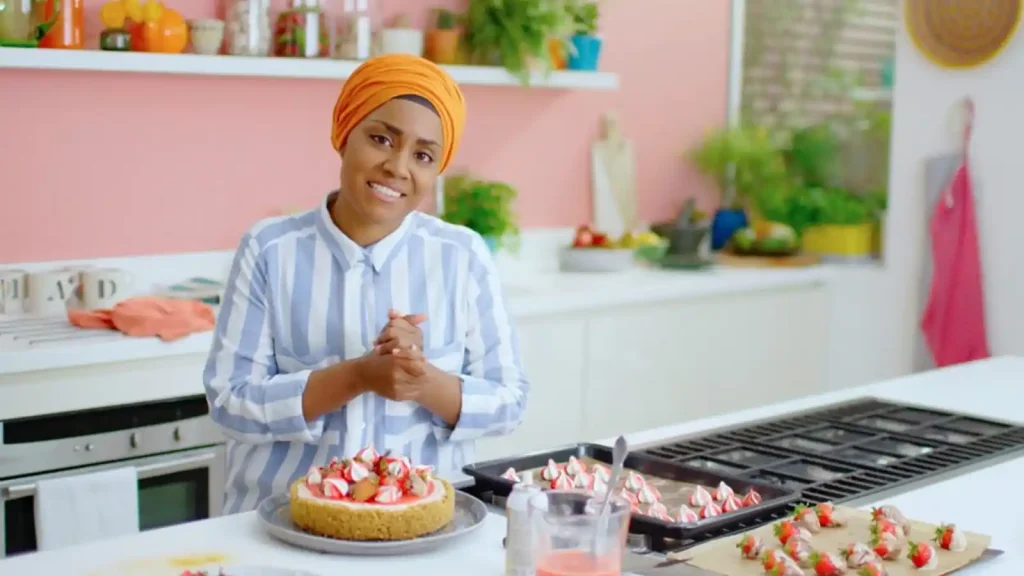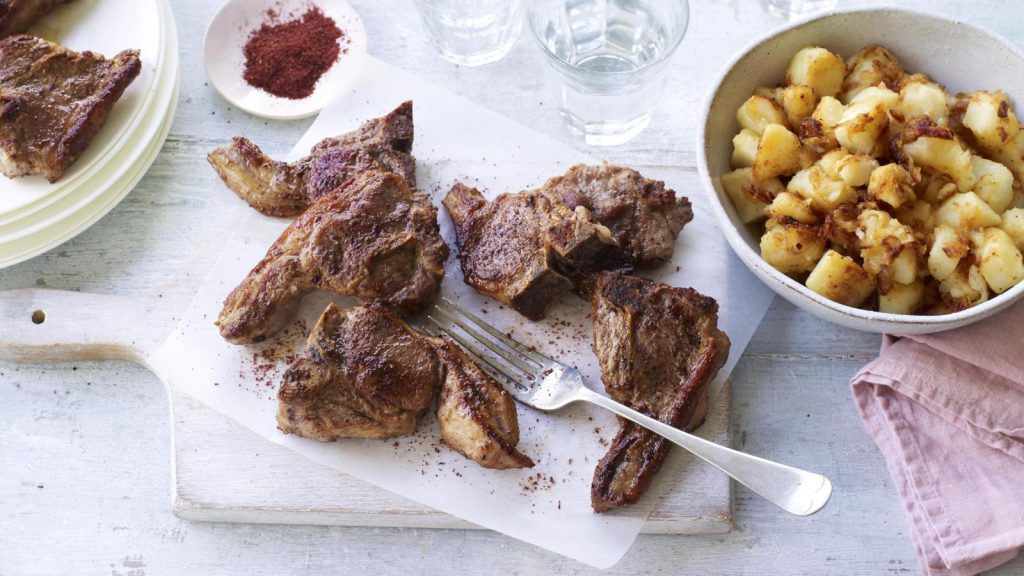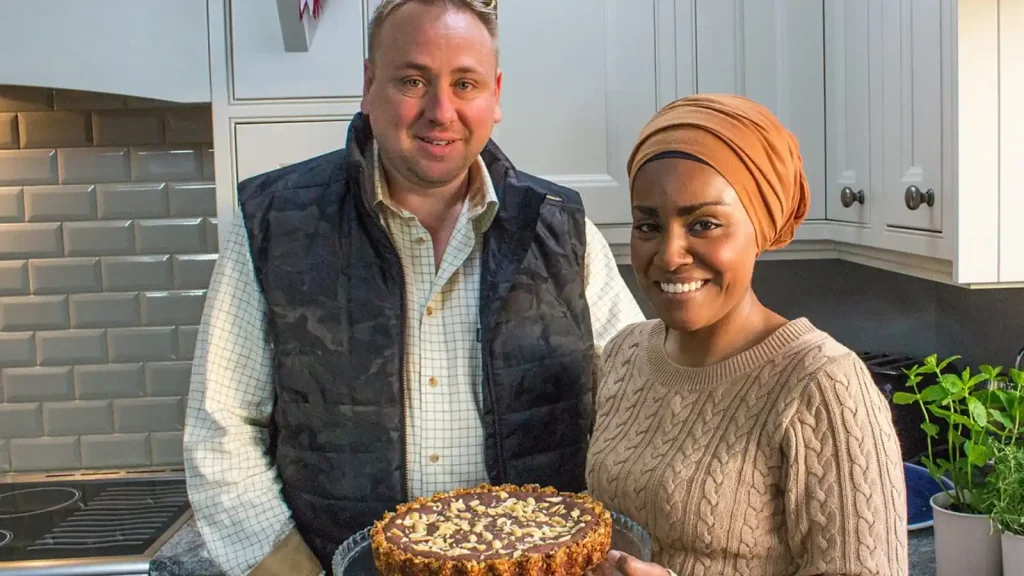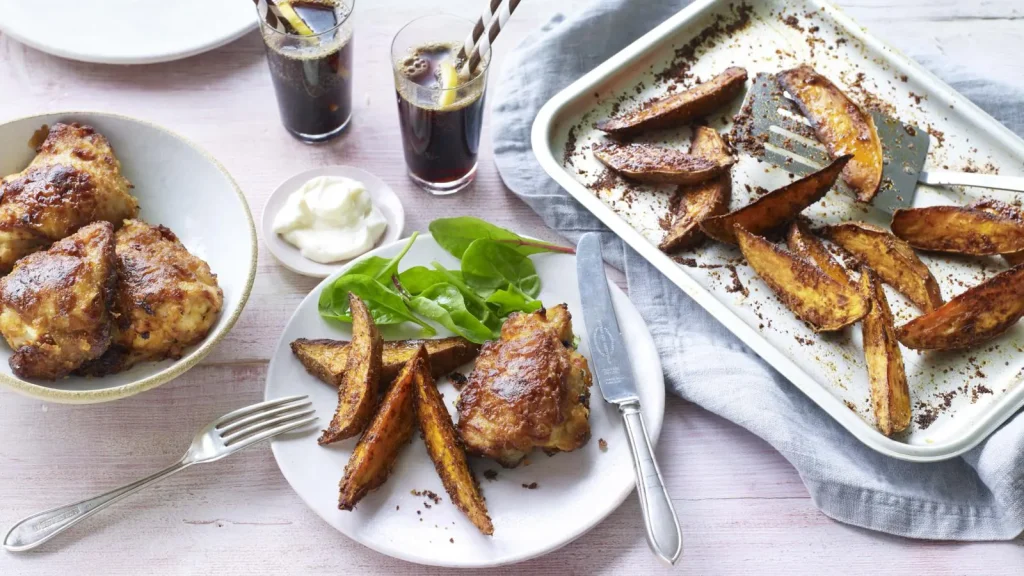Nadiya’s British Food Adventure episode 8 – Nadiya, the renowned baker and author, embarks on a culinary adventure through the idyllic landscapes of Wales, uncovering the rich tapestry of food stories that have elevated this region to a foodie haven. Before setting off, she pays homage to Wales’s legendary contribution to the baking world – the beloved Welsh cake. With her signature flair, Nadiya puts a twist on the traditional recipe, serving up fennel-flavored Welsh cakes accompanied by a luscious blueberry coulis.
Once in Wales, Nadiya’s quest is to unravel the secrets behind the world-famous Welsh lamb. Her journey leads her to Newton Farm, where she meets Richard Roderick, a third-generation sheep farmer who oversees 260 hectares of pristine land within the breathtaking Brecon Beacons National Park. Eager to immerse herself in the authentic experience, Nadiya receives a crash course from Richard on the essential skills of a modern-day shepherdess. Under his guidance, she commands the family sheepdog, Jack, to expertly round up the flock and move them to lush, new grazing pastures.
Surrounded by the glorious Welsh countryside, Nadiya sets up a makeshift cooking station and prepares a heartfelt thank-you meal for Richard – a flavorful fast lamb bhuna, served alongside fragrant garlic naan. This culinary gesture celebrates the delicious bounty of the land and the hard work of those who nurture it.
Nadiya’s adventure continues in Monmouth, where she encounters Desdemona Freeman and Denise Jones, the dynamic duo behind Petals of the Valley – the UK’s only home-grown edible rosewater makers. Often associated with Middle Eastern cuisine, rosewater once held a prominent place in British puddings, savory dishes, and preserves like rose jelly, rose petal jam, and rose petal vinegar, until the introduction of vanilla in the 17th century. However, the recent resurgence of foreign flavors and the popularity of chefs like Ottolenghi have sparked a revival of rosewater in the UK.
Nadiya’s British Food Adventure episode 8
Arriving during the fleeting six-week harvesting season, Nadiya eagerly lends a hand in gathering the last crops of roses. Undeterred by the pouring rain, the trio works tirelessly to collect the delicate petals, which must be picked as soon as they bloom – when their fragrance is at its peak, and their rose oil content is highest. With meticulous care, the petals are distilled with water in a copper still and finally bottled, capturing the essence of the rose.
As they await the distillation process, Nadiya, Desdemona, and Denise engage in a playful game of “I spy,” relishing the opportunity to savor the moment amidst the idyllic Welsh scenery. Nadiya showcases her mastery of this specialist ingredient by crafting a rose and raspberry fool, adorned with coconut flakes and homemade crystallized petals. With the rain subsiding, the three ladies relish their delectable creations al fresco, embracing the splendor of the Welsh countryside.
Finally, back in her own kitchen, Nadiya celebrates the bounty of Welsh seafood with her ingenious take on cooking mussels – deep-fried! Her popcorn mussels with paprika chive mayo recipe is an instant hit with her family, encapsulating the essence of Wales’s culinary treasures in every bite.
Through this captivating food adventure, Nadiya not only uncovers the rich culinary heritage of Wales but also pays homage to the passionate individuals who uphold these traditions, ensuring that the flavors and stories of this extraordinary region continue to thrive.
Nadiya’s British Food Adventure episode 8 recipes:
Nadiya’s lamb bhuna
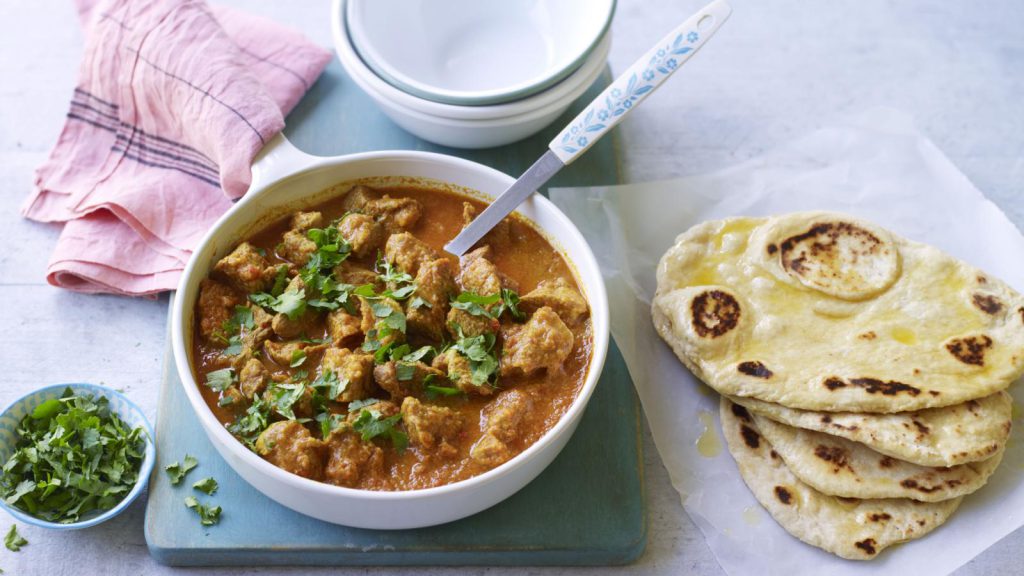
While I deeply cherish the warmth and comfort of a home-cooked curry, the reality of my time constraints led me to seek a quicker method to satisfy my cravings. This led to the creation of my go-to speedy curry solution: a delectable lamb bhuna. The secret lies in the sauce, which is rapidly prepared by blitzing the ingredients in a food processor before it hits the pan to cook.
Each portion of this savory dish generously delivers 763 kcal, providing 48g of protein for muscle repair and growth, 48g of carbohydrates (including a modest 5g of sugars) for energy, and 41g of fats (13g of which are saturates) to support cell growth and hormone production. Not to forget, it also offers 6g of fiber for digestive health and a mere 3.3g of salt, striking a balance between flavor and nutritional value. This recipe not only saves time but also ensures a nutritious meal that doesn’t compromise on taste.
Ingredients:
For the lamb bhuna
- 100ml/3½fl oz olive oil
- 1 tsp salt
- 5 garlic cloves, peeled
- 25g/1oz fresh root ginger, sliced
- 2 small onions, roughly chopped
- 1 large green pepper, seeds removed, roughly chopped
- 2 large red chillies, roughly chopped
- ½ tsp ground cinnamon
- ½ tsp ground turmeric
- 2 tsp curry powder
- 800g/1lb 12oz boneless diced lamb leg
- 15g/½oz fresh coriander, chopped
For the naan
- 200g/7oz self-raising flour, plus extra for dusting
- 2 tbsp garlic granules
- 1 tsp caster sugar
- 1 tsp salt
- 25g/1oz unsalted butter, softened, cut into cubes, plus extra for melting
Method:
- To make the curry paste, put the oil, salt, garlic cloves, ginger, onions, pepper, chillies, cinnamon, turmeric, curry powder and 50ml/2fl oz water in a food processor. Blend to a smooth paste and set aside.
- To make the naan, put the flour, garlic granules, sugar, salt and softened butter in a bowl and mix together. Rub in the butter.
- Make a well in the centre and add 100ml/3½fl oz of water. Mix with a palette knife, then bring the dough together using your hands. Knead the dough on a lightly floured surface for 3–4 minutes. Wrap in cling film and leave to rest at room temperature for 20 minutes.
- Meanwhile, to make the curry, add the curry paste to a large saucepan over a medium heat and cook for 10 minutes. Add the lamb and cook for another 10 minutes. Add 200ml/7fl oz water and simmer gently for 30 minutes with the lid on.
- Meanwhile, divide the dough into four equal pieces and roll each one out to the thickness of a pound coin.
- Put a griddle pan on a high heat and cook the breads one at a time for 3 minutes on each side. Cover with foil and keep warm while you griddle the rest.
- When the bhuna is cooked, remove from the heat and add the coriander. Melt some butter and brush the naans with it on both sides. Serve with the bhuna.
Rose, raspberry and coconut fool
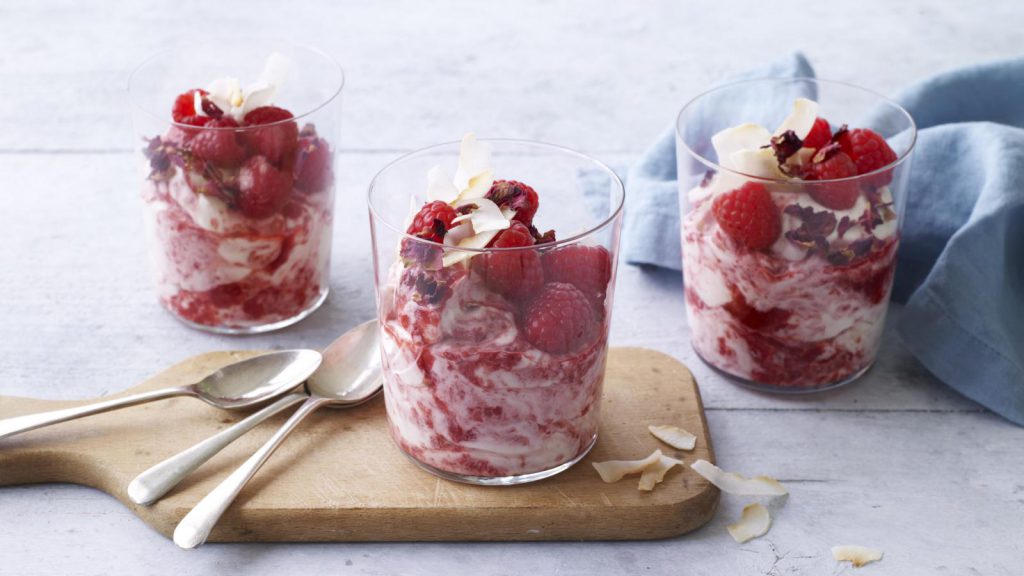
It seems that my refrigerator is perpetually stocked with cream and fruit, an endless bounty that begs to be utilized. What better method is there to honor these ingredients than by crafting a delightful dessert? Not a jest at your expense or mine, but rather a culinary creation known as a fool, where these components are transformed into a sublime treat!
Ingredients:
- 450g/1lb raspberries, plus 150g/5½oz for decorating
- 125g/4½oz caster sugar
- squeeze lemon juice
- 300ml/10fl oz double cream
- 100ml/3½fl oz Greek yoghurt
- 2 tbsp rosewater, or to taste
- 30g/1oz–50g/1¾oz toasted coconut flakes, to decorate
- small handful crystallized rose petals, to decorate (optional). See recipe tip below
Method:
- Put the raspberries and 50g/1¾oz of the sugar in a saucepan and add the lemon juice. Press the berries lightly with the back of a fork. Cook over a medium heat for 10–15 minutes, or until the mixture thickens, then remove from the heat and set aside to cool completely.
- Meanwhile, put the cream in a bowl with the remaining sugar and whisk to soft peaks. Add the yoghurt and rose water to taste (be careful as rose water varies considerably in strength) and whisk again gently. Pour in the cooled raspberry mixture and ripple through using the back of a knife.
- Spoon the mixture into six 150ml/5fl oz pots and leave to chill in the fridge for at least 1 hour.
- Top with extra raspberries, toasted coconut flakes and crystallized rose petals and serve.
Fennel Welsh cakes with a blueberry coulis
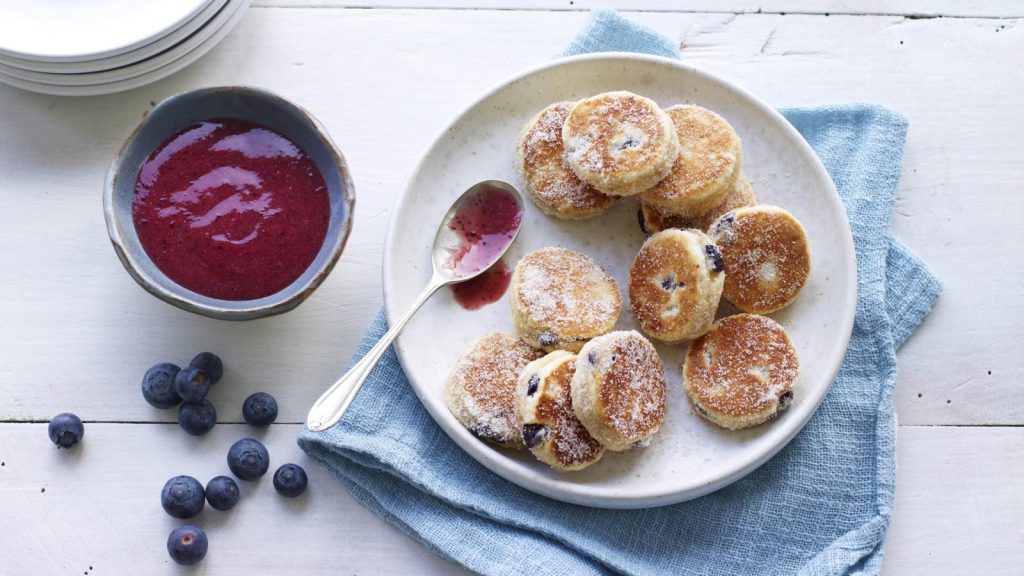
My rendition of the classic Welsh cakes takes a delightful twist, as I’ve decided to infuse them with the aromatic allure of fennel seeds. This choice not only imparts a subtle, sweet licorice flavor that beautifully complements the dough but also adds an element of surprise to the traditional recipe. Alongside the fennel seeds, I’ve incorporated tart dried blueberries into the mix, introducing a burst of tangy sweetness that contrasts wonderfully with the spiciness of the fennel.
To complete this culinary creation, I serve these Welsh cakes with a fresh blueberry coulis. This coulis, made from the freshest blueberries, adds a smooth, vibrant, and slightly tangy sauce that drapes over the cakes, enriching every bite with its fruity essence. This combination of flavors and textures transforms the simple pleasure of Welsh cakes into a more complex and memorable experience.
Ingredients:
For the Welsh cakes
- 225g/8oz plain flour, plus extra for dusting
- 285g/10oz golden caster sugar
- ½ tsp baking powder
- 1 tsp fennel seeds, crushed
- 100g/3½oz unsalted butter, cubed, plus extra for greasing
- 50g/1¾oz dried blueberries, roughly chopped
- 1 medium free-range egg, lightly beaten
- 2 tbsp whole milk
For the coulis
- 250g/9oz fresh blueberries
- 1 tbsp icing sugar
- squeeze lemon juice
Method:
- To make the Welsh cakes, mix the flour, 85g/3oz of the caster sugar, the baking powder and crushed fennel seeds together in a bowl. Add the cubed butter and use your fingertips to rub it in until the mixture resembles breadcrumbs. Add the blueberries and mix to combine.
- Make a well in the centre and add the egg. Use a table knife to mix the egg in, then add the milk and bring the dough together with your hands.
- Dust a clean work surface with flour and roll out the dough to 1cm/½in thickness. Cut out rounds using a 4cm/1½in round cutter, then take all the scraps, bring them together and re-roll. Cut out more rounds, and keep doing this until you have used up all the dough. Put the remaining 200g of caster sugar into a bowl.
- Lightly brush a medium non-stick pan with a little melted butter or spray with oil. Place a batch of Welsh cakes in the pan well spaced out, and cook over a low heat for 3 minutes. Turn them over and cook for another 3 minutes, then take off the heat and immediately dip each Welsh cake into the bowl of sugar. Set aside. Do the same for the remaining Welsh cakes: cook, coat in sugar and set aside.
- To make the coulis, purée the blueberries in a food processor with the icing sugar and lemon juice until broken down. Then push through a sieve to remove the seeds. Serve the coulis in a small bowl alongside the Welsh cakes.
